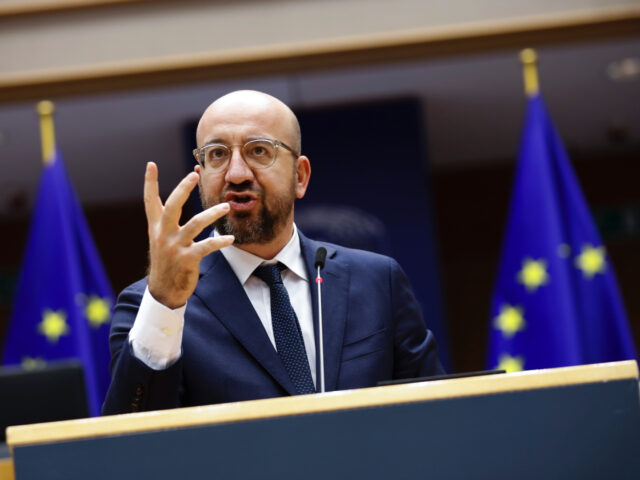The growing corruption scandal involving mostly socialists in the European Parliament allegedly accepting bribes from the Islamist kingdom of Qatar is “damaging the credibility” of the entire bloc, European Council President Charles Michel admitted.
Arrests made earlier this month by Belgian police of former European Parliament Vice President Eva Kaili, her partner Francesco Giorgi, former Italian socialist MEP Antonio Panzeri, among others for allegedly being involved in a bribery scheme with Qatar and Morocco may have damaged the ability of Brussels to function due to a lack of credibility in the institutions themselves, Charles Michel said.
In an interview with POLITICO, the top man at the European Council said that Qatargate is “dramatic and damaging for the credibility of the European Union”.
The Belgian eurocrat said that the “making it even more difficult for us to focus on the economic and energy crises that impact the lives of European citizens right now.”
Michel pointed towards ongoing negotiations with the Biden Administration over its Inflation Reduction Act, which has angered top EU leaders over its subsidies towards American green energy firms, an investment that some, including French President Emmanuel Macron, fear will further hamper the so-called renewable energy sector in Europe.
The EU Council chief went on to say that another major pending issue that could be inhibited by the Qatargate scandal is Europe’s growing “overdependency on China and the pressure being applied on us by China.” The statement on China is curious from Michel, given that he has been one of the leading voices within the bloc backing a potential Sino-European trade deal.
Nevertheless, the former Belgian prime minister said that if the EU cannot find some unity on these issues and overcome the credibility issues raised by the corruption scandal in the coming weeks, the bloc runs the risk of seeing a “fragmentation of the single market”.
Offices of Human Rights Organisations Shutter Amid EU Corruption Scandal https://t.co/8ES3ORGBQn
— Breitbart London (@BreitbartLondon) December 17, 2022
The scandal does not appear to be going anywhere, however, and looks as if it has the potential of dogging the bloc for months, with up to as many as 60 other members of the European Parliament reportedly being investigated in connection to the apparent bribery scheme.
This week Greek socialist MEP and former European Parliament Vice President Eva Kaili reportedly admitted to police that she had instructed her father to hide a suitcase full of cash for her. Her husband, Francesco Giorgi, has also reportedly admitted to having been involved in an influence campaign for Morocco and Qatar.
So far, Belgian authorities have discovered 1.5 million euros in alleged bribes at the home of Kali and former Italian MEP Pier Antonio Panzeri, who has also been arrested in relation to the probe.
In addition to the internal EU issues raised by Michel, the scandal also threatens a key alternative to Russian gas, namely supplies of Liquid Natural Gas (LNG) from Qatar.
The Sharia state is already one of the largest LNG importers to the bloc, however, countries such as Germany — which opened up its first LNG terminal last week — have sought to vastly expand this relationship in order to mitigate the losses of Russian gas following the breakdown in relations over the war in Ukraine and subsequent Western sanctions imposed upon Moscow.
Oh No! With EU Corruption Scandal Revealed, Concern That Right-Populists May Talk About it to Votershttps://t.co/IX5IGbht5K
— Breitbart London (@BreitbartLondon) December 14, 2022
Brexiteers in Britain, such as Nigel Farage, have pointed to the scandal as confirming their longstanding criticisms of the European Union.
Writing in The Telegraph this week, the Brexit leader said: “I saw at first-hand the constant exposure to lobbyists of all types. They have big expense accounts; they treat MEPs like VIPs; and they are very effective at what they do.
“Indeed, the only fact that has amazed me about this sleazy situation is the sheer efficiency and guile shown by the Belgian intelligence services in exposing it.”
Mr Farage said that the scandal was born out of the Brussels system itself, noting that while MPs in Britain are only afforded protection from prosecution for what they say in the House of Commons, MEPs in Brussels are granted immunity from prosecution no matter where they are as long as it was in pursuance of their role as a parliamentarian, which, according to Farage, effectively grants them “untouchable” status.
“The fact is that the EU bigwigs have constructed a body of politicians and bureaucrats who make up what is, in effect, a separate class,” he said.
“My contempt for this dishonest system knows no bounds. I only hope that the Belgian law enforcement agencies will next conduct an audit of other parts of the system – especially the European Commission, the EU’s executive arm. After all, that is where the real power to make laws and decide policy lies,” Farage concluded.
'Thank God We're Out' – Farage Responds to EU Parliament Corruption Arrests https://t.co/bhFBCdb4xo
— Breitbart London (@BreitbartLondon) December 11, 2022
Follow Kurt Zindulka on Twitter here @KurtZindulka

COMMENTS
Please let us know if you're having issues with commenting.